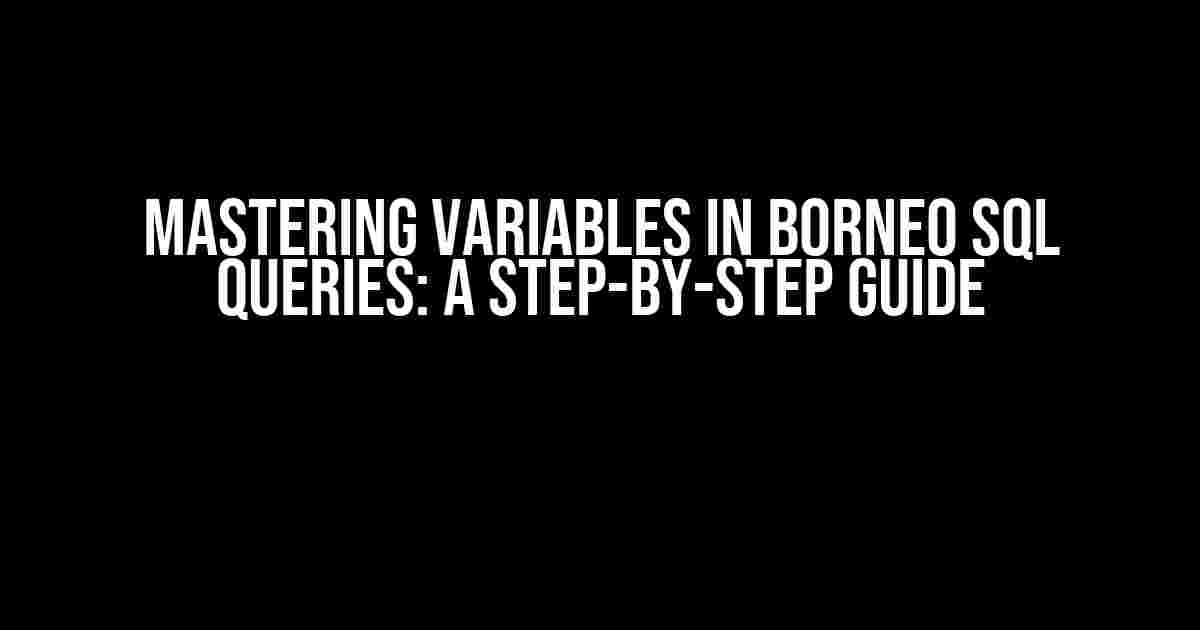Are you tired of writing clunky, hard-to-read SQL queries in Borneo? Do you struggle to keep track of your variables and constants? Worry no more! In this article, we’ll take you on a journey to master the art of declaring and using variables in Borneo SQL queries. By the end of this comprehensive guide, you’ll be writing efficient, readable, and maintainable code like a pro!
Why Variables Matter in Borneo SQL
Variables are an essential part of any programming language, and SQL is no exception. In Borneo SQL, variables allow you to:
- Store and reuse values throughout your query
- Simplify complex calculations and reduce code duplication
- Improve code readability and maintainability
- Enhance performance by reducing the number of repeated operations
Declaring Variables in Borneo SQL
In Borneo SQL, you can declare variables using the `DECLARE` statement. The basic syntax is:
DECLARE @variable_name data_type [ = initial_value ];Here, `@variable_name` is the name of the variable, `data_type` specifies the data type of the variable, and `initial_value` is the optional initial value assigned to the variable.
Example: Declaring a Simple Variable
DECLARE @my_variable INT = 10;In this example, we declare a variable named `@my_variable` with a data type of `INT` and an initial value of 10.
Using Variables in Borneo SQL Queries
Once you’ve declared a variable, you can use it in your SQL queries. Here are some examples:
Example: Using a Variable in a SELECT Statement
DECLARE @min_age INT = 18;
SELECT * FROM customers
WHERE age >= @min_age;In this example, we use the `@min_age` variable in the `WHERE` clause to filter customers who are 18 years or older.
Example: Using a Variable in a Calculation
DECLARE @tax_rate DECIMAL(4,2) = 0.08;
SELECT order_total * (1 + @tax_rate) AS total_amount
FROM orders;In this example, we use the `@tax_rate` variable to calculate the total amount by adding the tax rate to the order total.
Borneo SQL Variable Data Types
Borneo SQL supports a variety of data types for variables, including:
| Data Type | Description |
|---|---|
| INT | Whole number, e.g., 1, 2, 3, … |
| DECIMAL(n,m) | Decimal number with n digits in total and m digits after the decimal point, e.g., 3.14 or -0.5 |
| VARCHAR(n) | Character string with a maximum length of n, e.g., ‘Hello, World!’ or ‘abc’ |
| DATE | Date value, e.g., ‘2022-07-25’ or ‘2023-01-01’ |
| TIME | Time value, e.g., ’12:30:00′ or ’14:45:15′ |
| DATETIME | Date and time value, e.g., ‘2022-07-25 12:30:00’ or ‘2023-01-01 14:45:15’ |
Best Practices for Using Variables in Borneo SQL
To get the most out of variables in Borneo SQL, follow these best practices:
- Use meaningful variable names: Choose names that clearly indicate the purpose of the variable, making your code easier to understand and maintain.
- Declare variables at the top of your query: This makes it easier to keep track of your variables and reduces the risk of scope issues.
- Use variables consistently: Apply variables consistently throughout your query to ensure readability and maintainability.
- Avoid using variables with ambiguous names: Avoid using variable names that can be confused with column names or other identifiers in your query.
- Test and optimize your queries: Regularly test and optimize your queries to ensure they’re performing efficiently and effectively.
Conclusion
Mastering variables in Borneo SQL queries is a crucial step in writing efficient, readable, and maintainable code. By following the guidelines and best practices outlined in this article, you’ll be well on your way to becoming a Borneo SQL expert. Remember to declare variables clearly, use them consistently, and test your queries regularly to ensure optimal performance.
With variables, you can simplify complex calculations, reduce code duplication, and improve code readability. So, what are you waiting for? Start declaring and using variables in your Borneo SQL queries today and take your SQL skills to the next level!
Frequently Asked Question
Getting started with Borneo SQL queries, but stuck on declaring and using variables? Don’t worry, we’ve got you covered! Here are the top 5 questions and answers to help you navigate the world of Borneo SQL variables.
Q1: How do I declare a variable in Borneo SQL?
To declare a variable in Borneo SQL, you use the `DECLARE` statement followed by the variable name and its data type. For example: `DECLARE @myVariable INT;`. Remember to end the declaration with a semicolon!
Q2: Can I use variables in the `SELECT` statement?
Yes, you can use variables in the `SELECT` statement to make your queries more dynamic. For example: `SELECT @myVariable AS result;`. Just make sure to declare the variable before using it in the query!
Q3: How do I assign a value to a variable in Borneo SQL?
To assign a value to a variable, use the `SET` statement followed by the variable name and the value. For example: `SET @myVariable = 10;`. You can also use the `SELECT` statement to assign a value from a query result. For example: `SELECT @myVariable = AVG(price) FROM products;`.
Q4: Can I use variables in the `WHERE` clause?
Yes, you can use variables in the `WHERE` clause to filter your query results. For example: `SELECT * FROM products WHERE price > @myVariable;`. Just make sure to declare the variable before using it in the query!
Q5: Do I need to use a semicolon to end the variable declaration?
Yes, it’s a good practice to end the variable declaration with a semicolon (`;`) to separate it from other statements in your query. This helps avoid syntax errors and makes your code easier to read!

